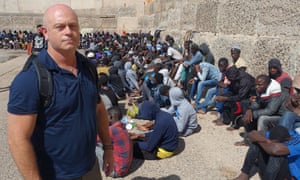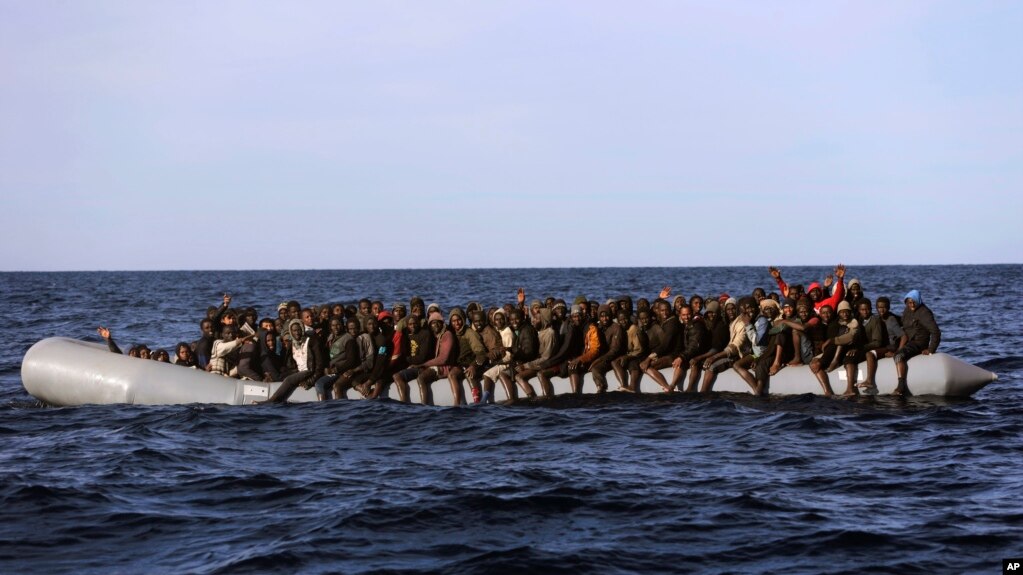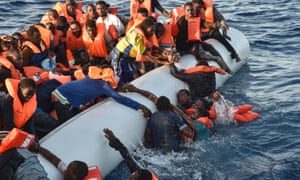Desperately Hoping to Stem the Tide
"The young men who received this training, when they return to their country, will face enormous pressure from criminal gangs and smugglers who have an influx of millions of euros a week."
Joseph Muscat, Prime Minister of Malta
"It's a first step taken with an interim government that doesn't really control the country, but it's a first step."
Natalino Ronzitti, adviser, Institute for International Affairs, Italy
"[Keeping migrants in Libya is a] dangerous step [since the country is without the required resources to deal with them]."
Hussein Thwadi, mayor, Sabratha, Libya
 |
| ‘We have a heightened responsibility towards Libya because of the role Britain played in bringing down the Gaddafi dictatorship.’ Photograph: Dave Williams/Sound Ltd |
"The losses of lives we see are more and more in the territory of Libyan waters and so it is a legal responsibility to prevent these losses of life. We are ready to help, train and support [the coastguards], in a sense of partnership and enabling the Libyan authorities to manage [the situation]."The internationally respected group Doctors Without Borders last year spoke of the "alarming levels of violence" being exercised against migrants and refugees in Libya. Sexual attacks, killings that have occurred against refugees and migrants, perpetrated by smugglers, but as well from among the many armed groups and individuals who lurk in the divided country, with its two governments and assortment of tribal militias wreaking havoc everywhere.
Federica Mogherini, European Union foreign policy chief
The European Union has been training officers of the Libyan Coast Guard in the art of interception and rescue of migrant boats near the coast of Libya. The interception is to keep migrants from reaching international waters. Once that happens, it is up to the Italians to launch rescue missions to retrieve thousands of hapless migrants from the seas their unseaworthy ships have capsized in. Instead, the Italians have been recruiting and training Libyans.
Through Libyan interception the migrants are returned to Libya, a country that has been in violent disarray since the NATO-led aid given to a Libyan popular movement to remove Moammar Ghadaffi from office. His tyrannical grip of the country removed, and international coalition partners, Italy, France, Britain, United States and Canada withdrawn, lauding themselves for the success of their mission, the country simply fell apart.
Now, with two contesting governments and tribal militias roaming about, the general state of lawlessness has given Islamic State a new place to lodge itself. And it is to Libya's coast that migrants hoping to reach European shores launch themselves from. Inundating Europe in the process, and striking the conscience of the West through the thousands of lives of children, women and men lost to the seas when rescue missions have failed.
 |
| Migrants crowd a rubber boat as they are rescued by members of Proactive Open Arms NGO, in the Mediterranean Sea, about 22 miles north of Zumarah, Libya, Jan. 27, 2017 Associated Press |
Of the 180,000 migrants who managed to reach Italy last year, five thousand died in the attempt. On February 21 alone, 75 bodies washed ashore in Libya, coughed up by rough seas. The Western-backed government in Libya faces the impossible prospect of maintaining an semblance of order on the coast, where criminals and rebels dominate.
Recently in Malta, European leaders pledged themselves to upholding "sustainable and predictable" funding to benefit the Libyan Coast Guard. Paolo Gentiloni, prime minister of Italy, signed an agreement with Fayez Serraj, the Libyan premier, to make an effort to curb the migrant trafficking from the very shores of Libya that he cannot control. Unlike the agreement that the EU made with Turkey's President Recep Tayyip Erdogan who can control his coastline on the Mediterranean.
Italy has promised to provide to the Libyan government funding, technology, medicine and training for the establishment of migrant holding centers in Libya, a country that Italy in its colonialist past ruled as a colony in the years 1911 to 1943. Italy's defense minister, Roberta Pinotti, spoke of the thousands of weekly arrivals in Italy as "a phenomenon that we want to be able to govern", understandably.
The proliferation of criminal gangs and militias that make their base in Libya see migrant smuggling as a lucrative business. A business that victimizes huge numbers of migrants who face constant threats. These agreements reflect the desperation inherent in Europe's forced welcome of hundreds of thousands of economic migrants from North Africa, and refugees and migrants from the Middle East, inundating the continent.
It would take the hope of desperation to believe that a unity government scarcely capable of controlling its capital Tripoli could extend itself to exert the military muscle, political intent or funding to stop the trade, reflecting just how dire the situation is for all concerned.
 |
| More than 5,000 people drowned last year trying to cross the Mediterranean into Europe. Photograph: Andreas Solaro/AFP/Getty Images |
Labels: Crisis Management, European Union, Libya, Migrants

<< Home